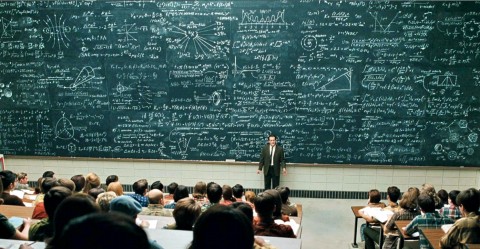Perthblog
High Frequency Trading Trashed by Quantum Computers?

I’m sure you’ve all heard of high-frequency trading (HFT). We now realize that HFT could actually bring down the stock market. As it is, HFT accounts for at least half of all the stock trading in the US.
This isn’t to complain about HFT. It is what it is. Maybe it makes it hard for small investors. It’s certainly changed the nature of equity trading and thus of equity arbitrage which thus impacts investing generally as well as M&A.
Fast-forward to HFT in the near-future. Google is now running the D-Wave “quantum” computer it acquired from Canadian company D-Wave. It’s rated at 1000 qubits (don’t ask). On the scale of quantum computers that’s awesome. Google is still figuring out what it can do with it. That doesn’t mean running big spreadsheets by the way.
There’s a wrinkle though, actually a pretty big one. The D-Wave is not seen by the purists as being a true quantum computer. It’s a hybrid and as such it doesn’t beat conventional computers on many types of problems.
But the race is on. IBM claims to have the real McCoy. It’s widely suspected that a number of private companies are well-advanced.
More to the point we can be pretty sure that the spooks in the US, Russia, China, Israel and others are also well-advanced in their development of a machine that can be used for code-breaking and the like. The NSA has already been confirmed to be building one. So we can be dead sure that the other countries aren’t far behind. In fact it’s quite on the cards that one or more could be ahead.
So where are we going with all this? Looks like HFT will soon get a big lift from quantum computers. So it will get faster. Now that’s when things get really interesting. What do we really mean by “faster”?
The nature of quantum computers is that they can use the phenomenon of superposition to do a huge number of computations all at the same moment. So when you talk about using a quantum computer for speedy trading, “speedy” means something totally different. In many cases it means instantaneous, no matter how big the problem.
It all depends on the problem. But it’s conceivable that it could be applied to a problem such as predicting the values of all stocks in the world for the next 100 years in one calculation. Or it could calculate the values of all counterparty contracts in the market for the next year. Or simultaneously go short and long on every stock in the world, maybe without people even knowing it. Etc. etc. and so on.
In other words, suddenly HFT is going to look painfully slow, In order to get back into the race the HFT-ers are going to have to acquire one or more quantum computers. It’s going to be the new toy for Wall Street grownups. If you aren’t doing HFT with quantum computers, you won’t compute J
Here’s another thing. Once you have a quantum computer, totally new types of arbitrage are going to open up. In fact the idea of arbitrage itself is going to change. That’s because quantum computers can in certain circumstances be used to introduce and leverage time dilation (go ask a philosopher). So if you think you’re gonna just do things faster, think again. You’re going to have to do them different, very different.
Now I’m definitely not the right person to be talking to about what they can and will actually do. But we can say one thing for sure. They will do things that are unimaginable right now in the investment and equity prediction spaces, inter many alia. And it will all happen pretty soon.
But here are a few odds and ends that occur to me as being issues that are going to emerge as quantum computers are deployed.
The good news:
- Quantum trading will open up new opportunities for active investing once quants figure out how to make it all work.
- Same thing for alternative investing.
- It’s going to change the nature and potential profitability of arbitrage.
- We might all actually get to know the real exposure from derivatives, synthetics and exotics.
The bad news
- Trading ahead of the market will now become vastly more simple, powerful and hard to detect.
- There’s going to be some huge mistakes made by traders, any one of which could break the markets globally.
- The problem of rogue traders is going to be much more difficult and serious. Instead of trades for a few million maybe they will be for a few billion, or even more. How about a rogue trade for several trillion that goes wrong?
- This is going to lead to serious issues in money laundering, and other computer-enabled criminal acts such as digital theft (c.f. the IMDB mess in Malaysia and the recent Bangladeshi central bank heist).
The terrible news (for traders and their sponsors):
- The Feds are going to amp up their regulatory efforts - by a quantum leap (get it? :) )
- Trading and investment services are going to have to ramp up their compliance by another even more quantum amount, which will make their already-diminishing earnings look even more pitiful
- “Too big to fail” is going to mean companies that are much smaller than right now. A company with just a few traders could well be too big to fail – maybe it can’t fail even if it’s one person. That means a lot more regulatory pressure on trading and financial services firms, even tiny ones.
Quantum computers are definitely progress and overall they are going to improve the human condition.
But that doesn’t mean the money men and women aren’t going to suffer disproportionately.
When you subscribe to the blog, we will send you an e-mail when there are new updates on the site so you wouldn't miss them.
